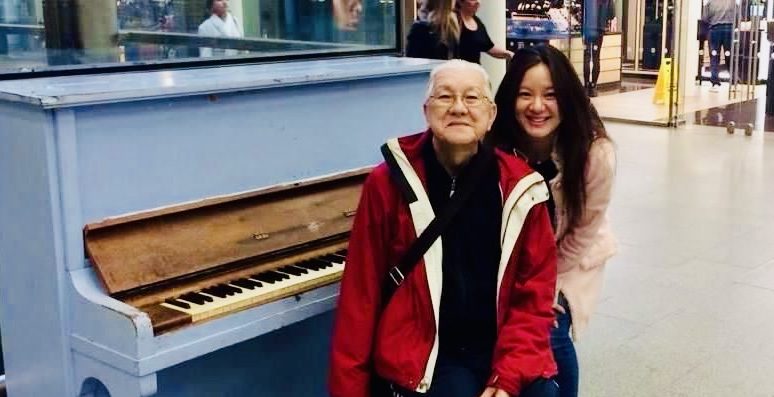Jazz interview with Jazz pianist Cheryl Ann Spencer. An interview by email in writing.
JazzBluesNews.com: – Let’s start with where you grew up, and what got you interested in music?
Cheryl Ann Spencer: – I grew up in Singapore in a music-centered family. My late father was a professional pianist and loved sharing his passion for music with us. We listened to music at home and in the car all the time. I fondly remember our holidays to Europe together, where my father would bring us to classical concerts and operas! Before he passed away, he persuaded me to pursue jazz. While he loved listening to jazz and attending jazz performances, he could never really get into playing the genre. However, he thought my keen ear for music and lively personality would make me a good jazz musician!
JBN: – How did your sound evolve over time? What did you do to find and develop your sound?
CAS: – My sound has evolved to modern jazz voicings and harmonics. I love modal jazz and quartal voicings. I listen to and transcribe the works of Mc Coy Tyner, Robert Glasper, Brad Mehldau, Herbie Hancock, Aaron Goldberg and Kenny Barron. I transcribed the solos to practice my hearing ability and also observe how the masters build their solo lines and voicings. Good jazz makes me happy and excited.
JBN: – What practice routine or exercise have you developed to maintain and improve your current musical ability especially pertaining to rhythm?
CAS: – I listen to odd meter music by the jazz masters. Sasha Mashin, Alex Sipiagin, Brad Mehldau, Branford Marsalis and Christian McBright. Complex meter songs get me motivated as it creates a different propulsion to the piece. I will practise singing and clapping the odd meter piece before attempting to play it on the piano. If you can’t sing it at the right tempo, you probably can’t play it correctly. I am very strict with myself. I am also taking drum lessons now to improve my rhythm.
JBN: – How to prevent disparate influences from coloring what you’re doing?
CAS: – I welcome the influences of great jazz musicians and believe that jazz develops and grows with its influence. However, I look to include my own identity and sound in my playing as I believe the audience can feel my personality shining through during my performance. My compositions are a reflection of my taste and personality.
JBN: – How do you prepare before your performances to help you maintain both spiritual and musical stamina?
CAS: – I am a Christian and I usually play a gospel jazz hymn as the opening song in all my performances. The final week is the most important period of sharpening for me and my band. It is important to prepare our mind before each performance.
JBN: – What’s the balance in music between intellect and soul?
CAS: – It is important to apply the scales that we practice in a heart-felt and true way. The scale itself is intellectual. But how can we break it apart and reassemble it in a beautiful way during our solos? Was the solo melodic or just pure regurgitation of scales? I often question myself.
JBN: – There’s a two-way relationship between audience and artist; you’re okay with giving the people what they want?
CAS: – At the end of the day, I hope Evolution Quartet would be able to stand out from the crowd with our unique sound. We enjoy reharmonising and adding to classic tunes such as ‘My Favourite Things’ from The Sound of Music, and we hope that listeners would appreciate our efforts in bringing new things to the table. We must find the right balance.
JBN: – Please any memories from gigs, jams, open acts and studio sessions which you’d like to share with us?
CAS: – We had a great gig at Singapore premier jazz club Maduro. We are very selective in the venues. We were also honoured to record Reflections with Alex Sipiagin. There was great synergy in the recording studio.
JBN: – How can we get young people interested in jazz when most of the standard tunes are half a century old?
CAS: – I hope to conduct jazz workshops and concerts in Singapore local schools in the future. I’ve even created my own teaching materials which I call the ‘Jazz Fun Box’ and ‘Jazz Activity Book’ to help students learn music in a more engaging and fun manner. Children must be exposed to jazz music from a young age. I have two kids and I often ask them for feedback and get ideas from them as it is important to see it from a child’s perspective!
JBN: – John Coltrane said that music was his spirit. How do you understand the spirit and the meaning of life?
CAS: – That means music was his everything! Life is about balance. In order to be good musicians, we need to be balanced as a person. We need to see the beauty around us in different forms in order to be inspired. We cannot drive on a one way road… we need to pause, reflect and take necessary turns.
JBN: – If you could change one thing in the musical world and it would become a reality, what would that be?
CAS: – For people to recognize and respect musicians. It is really hard work and they must be compensated fairly.
JBN: – Who do you find yourself listening to these days?
CAS: – Brad Mehldau, Chick Corea, Herbie Hancock, Robert Glasper…
JBN: – What is the message you choose to bring through your music?
CAS: – I would like my music to bring joy and peaceto the listener. Simply a smile!
JBN: – Let’s take a trip with a time machine, so where and why would you really wanna go?
CAS: – I would like to go to the Bebop and Cool Jazz era!
JBN: – I have been asking you so far, now may I have a question from yourself…
CAS: – What inspired you to be a jazz critic? Do you play any instruments?
JBN: – How did you like this interview?
CAS: – Thank you for the interview, I appreciate you reaching out to us and I hope to see you in person one day!
Interview by Simon Sargsyan







More Stories
Interview with Janis Siegel of The Manhattan Transfer: Jazz, being a more refined, interpreted form of music
CD review: George Benson – Dreams Do Come True: When George Benson Meets Robert Farnon – 2024: Video, CD cover
The band was tight as ever. The Warren Haynes Band cuts loose: Video, Photos